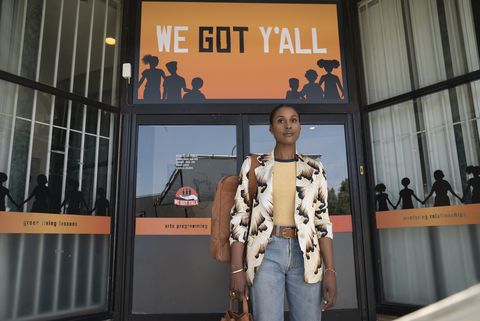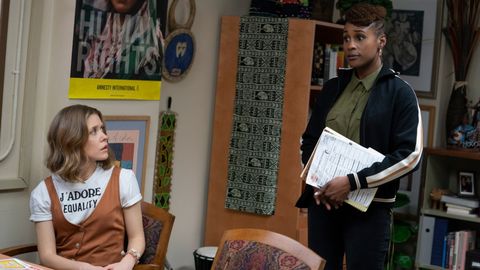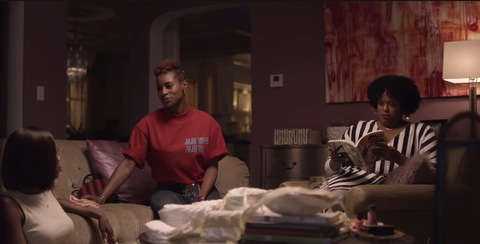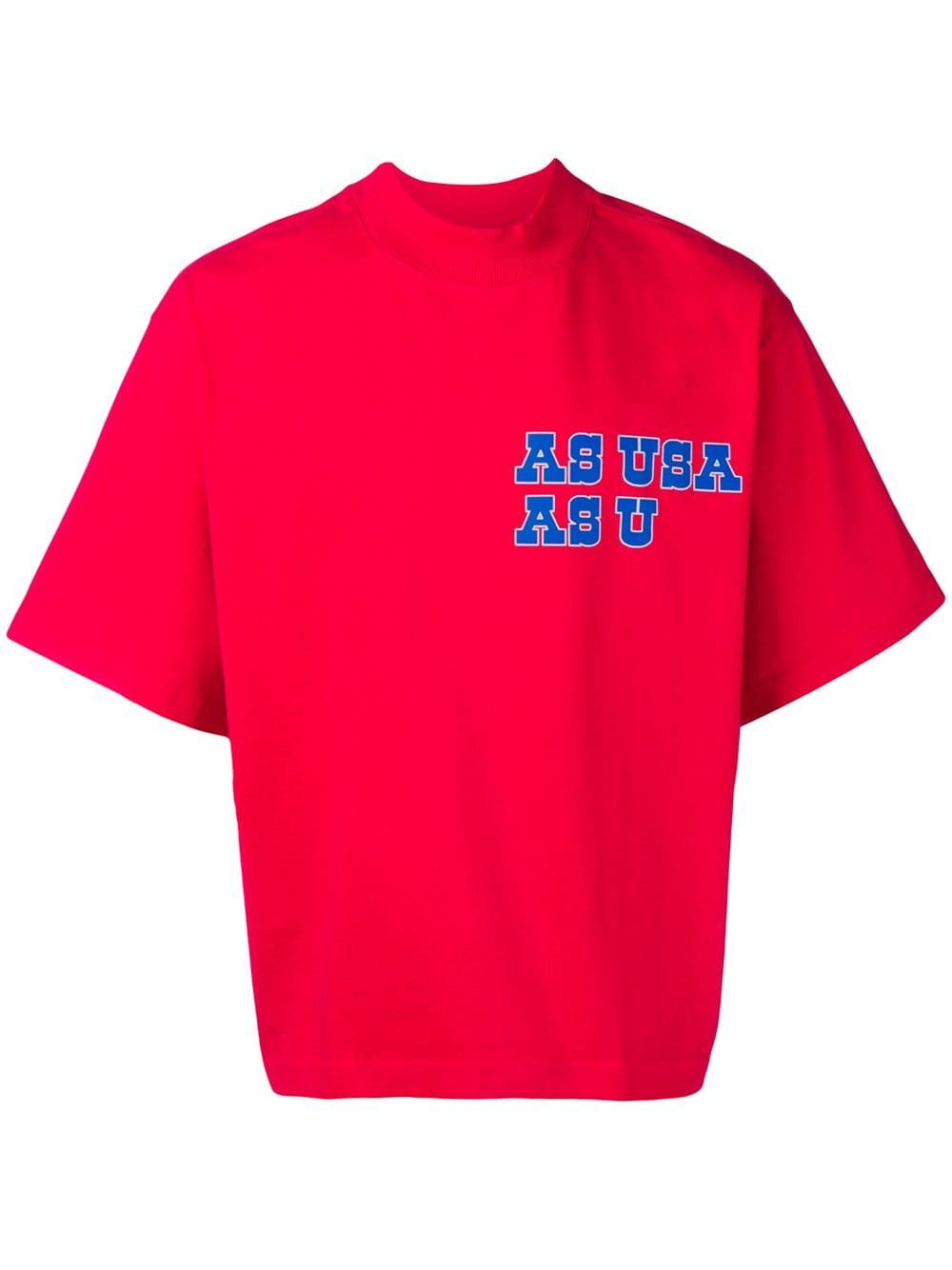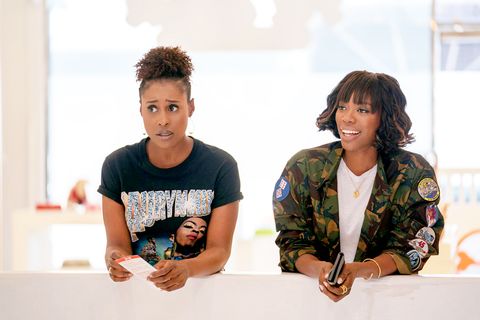
This post contains spoilers about the third season of Insecure.
It’s impossible to watch Insecure, creator and star Issa Rae’s hilarious and unabashedly honest show about “regular black people being basic” and not feel like the characters are talking directly to you and about you and your friends. But Insecure’s best storytelling doesn’t just come from the four girlfriends’ real-talk conversations or Issa’s character’s introspective, rapid-fire bars—it’s on the t-shirts.
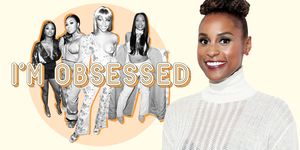
This season, “playfully tailored” stylist Shiona Turini took the reins and said she wanted to continue dressing the characters in “conscious clothing.” Issa, her BFF Molly, even Issa’s former co-worker Freida’s style continue to push political conversations to the forefront, and the clothing they wear encourages earnest conversations both onscreen and IRL.
View this post on Instagram
“Gal, you a walking trophy” – @hoodcelebrityy ?: @tylerjoe
A post shared by Shiona Turini (@shionat) on
Don’t get me wrong: Insecure does discuss Big Issues through dialogue, too. Like when Molly discovers she’s paid less than her white male colleague in season two. Or when Issa says, “They are how they are” when candidly talking about her white coworkers to a job applicant.
But instead of the characters focusing on those Big Issue moments through dialogue for long stretches of time, the characters have to move on to the next thing and get back to work, as they would in real life. And just like the real world, these heavier themes are, unfortunately, a part of their reality. And they don’t have to talk about it for us to understand that the characters are internally affected—thanks, in part, to their wardrobes.
Take, for instance, when Molly’s white therapist judges her for using the N-word and wants to “unpack” it, Molly and Issa spend about a minute talking about it. In the same episode, Issa wears a sweater that says “N*ggas” with no added commentary on why she’s entitled to wear it.
The clothing urges viewers to take action and seek answers on their own.
In season two’s “Hella L.A.,” when Lawrence is pulled over for making an illegal U-turn and has a tense encounter with a police officer, he has to drive away and continue on once it’s over. Later that season, Issa wears a “FBI Killed Fred Hampton” shirt, which calls out how the FBI killed one of the leaders of the Black Panthers, and Molly wears a “Trayvon” hoodie, which is a clear reference to how George Zimmerman killed 17-year-old Trayvon Martin for “just walking around.”
It’s instances like these that make clear these characters are consciously considering, and living through, these issues with sharp and unapologetically strong POVs.
If you’ve been watching season three (duh, aren’t we all?), then you already know: Issa quit her job at We Got Y’all in the “Fresh-Like” episode this season. But who could forget her work uniform: a T-shirt with “We got y’all” written across the front alongside a white hand holding three black children.
Surprisingly, the white savior “We got y’all” T-shirt opened itself up to a new this-is-problematic-AF dialogue among Issa’s equally problematic coworkers this season, but for two seasons, it was an elephant in the room for Issa and viewers.
Also this season, Issa’s coworker, Frieda, ventures out from her typically solid-colored wardrobe and wears a graphic T, only her “J’adore equality” one is like a parody of herself–a white woman who tries to be understanding and thoughtful when it comes to issues like racism, but doesn’t speak up when Issa tries to discuss the lack of diversity at their job. For Frieda, politics and social issues are treated like something that’s in fashion whenever it suits her and out the moment she feels uncomfortable and it doesn’t immediately benefit her.
In the post-Coachella episode in season three, Issa wears a bold red cropped sweater that has “As USA As U” emblazoned across the front in blue and white, which feels like a reference to, I don’t know, nearly all cable news chyrons right now. Who gets to be considered a patriot these days? Is it the president? Or is it the NFL player who risks everything to stand up for civil rights? And the immigrant parents who reach America seeking a better future for their families despite the constant threat their children will be put into cages?
Issa doesn’t have to answer the question for you because it’s one we’re confronted with every day. You can answer it for yourself.
By subtly hinting at important topics like supporting black businesses and artists with the “Support Your Friends” shirt a rapper wore during a studio session with Issa’s friend Daniel, and alluding to the low college enrollment rates for black students with Issa’s “A Mind Is a Terrible Thing to Waste” vintage United Negro College Fund shirt, the clothing urges viewers to take action and seek answers on their own.
Insecure, at its core, is about black people, but it does something that many shows that want to focus on the political and social issues that black people face don’t–it often chooses to hold back from tackling, head-on, those hot topic conversations that are present in shows like Black-ish, which dedicated entire episodes to the election, the N-word, and police brutality.
In that respect, Insecure‘s commentary may seem softer, but it’s actually omnipresent. It’s always in your face.
Source: Read Full Article
